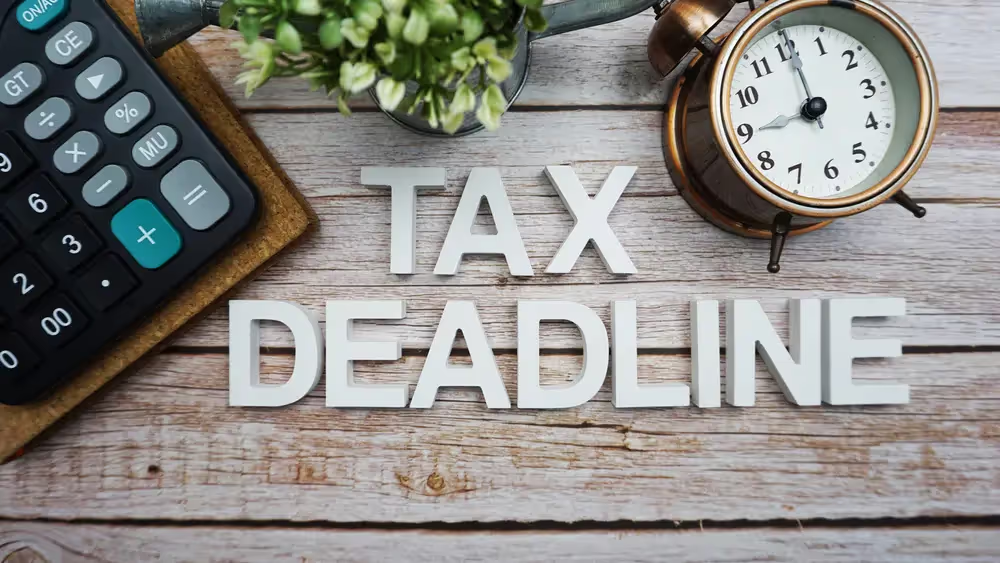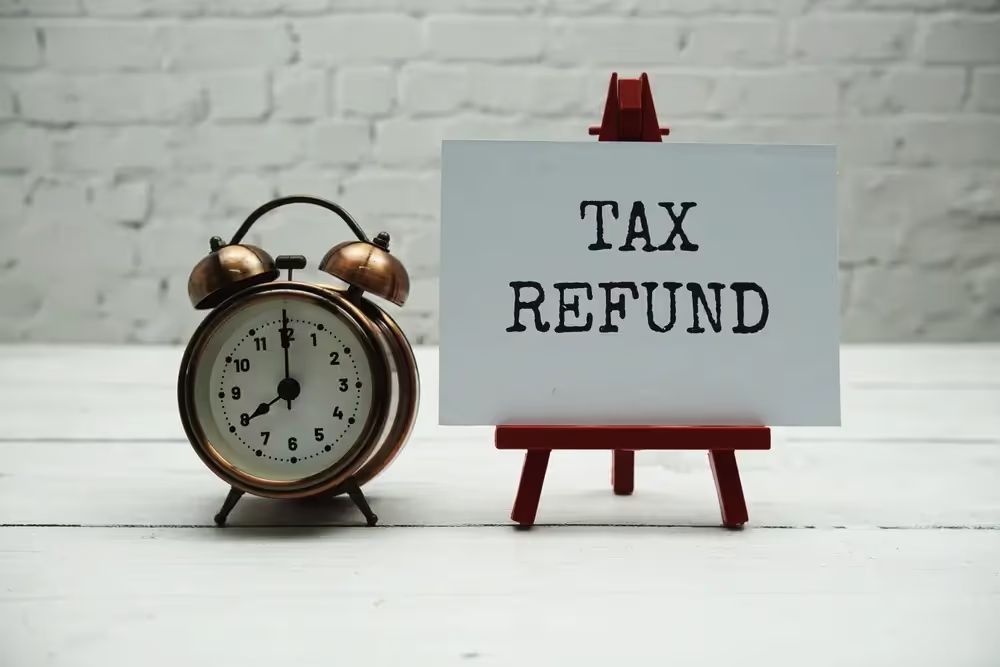When Are Taxes Due? Tax Day and Deadlines for 2023 and 2024

As the saying goes, there are only two things certain in life: death and taxes. While we can't avoid either, we can ensure we stay on top of our tax responsibilities by knowing the important dates and deadlines plus the general amount you owe based on your federal tax brackets. In this article, we'll be discussing the tax deadlines for 2023 and 2024 and why it's essential to stay organized and informed.
Important Tax Deadlines
Tax deadlines are important because they determine when to file your tax return and pay any taxes owed. Missing a tax deadline can result in penalties and interest, which can add up quickly. By staying on top of tax deadlines, you can avoid these extra costs and ensure you meet your tax obligations.
When Are Taxes Due in 2023?
In 2023, taxes are due on April 15th for most individuals. That was the deadline for filing your federal income tax return and paying any taxes owed to the Internal Revenue Service (IRS). It's important to note that since April 15th falls on a weekend, the deadline may be extended to the next business day.
Staying organized and informed about tax deadlines is crucial to avoid unnecessary stress or financial burdens. By marking these dates on your calendar and setting reminders, you can ensure you have enough time to gather all the necessary documents and information to complete your tax return accurately.
It's also essential to keep track of any changes in tax laws or regulations that may affect your filing status or deductions. The tax code is constantly evolving, and staying informed about these updates can help you maximize your deductions and minimize your tax liability.
In addition to the federal tax deadlines, it's important to be aware of any state or local tax deadlines that may apply to you. Each state has its own tax laws and deadlines, so it's crucial to research and understand the specific requirements for your location.
What if the 2023 Tax Deadline was Missed?
If you happen to miss the 2023 tax deadline, don't panic. You can still take steps to rectify the situation and file for an extension. First, you should file your tax return as soon as possible. Even though you missed the deadline, it's better to file late than not at all. By doing so, you can avoid any additional penalties or interest that may accrue the longer you wait. Also, if you can’t fully pay your tax bill, you can contact your accountant or the IRS to apply for a payment plan.
When Are Taxes Due in 2024?
The tax deadlines for 2024 are as follows:
- January 16, 2024: This is the fourth quarter estimated tax payment deadline for the 2023 tax year. If you are self-employed or have other sources of income that are not subject to withholding, you may need to make estimated tax payments throughout the year.
- January 31, 2024: The due date for employers to send W-2 forms to employees.
- April 15, 2024: This is the deadline for filing your 2023 tax return and paying any taxes owed. If you cannot file by this date, you can request an extension until October 15, 2024. However, any taxes owed must still be paid by April 15.
- June 17, 2024: This is the second quarter estimated tax payment deadline for the 2024 tax year.
- September 16, 2024: This is the third quarter estimated tax payment deadline for the 2024 tax year.
- October 15, 2024: If you requested an extension, this is the deadline for filing your 2023 tax return. Again, any taxes owed must still be paid by April 15.
It's important to note that these deadlines may vary for specific individuals or businesses, so it's always best to double-check with the IRS or your tax professional.
How Can I Stay Organized for Tax Deadlines?
Staying organized for tax deadlines can save you a lot of stress and headaches in the long run. Here are some tips to help you stay on top of your tax responsibilities:
Keep Track of Important Dates
The first step to staying organized is to keep track of important dates. This can be done by using a calendar or setting reminders on your phone. Make sure to include all tax deadlines and any other important dates related to your taxes, such as when your W-2 or 1099 forms are due.
Keep All Tax Documents in One Place
It's essential to keep all your tax documents in one place so you can easily access them when it's time to file your taxes. This can include W-2 forms, 1099 forms, receipts, and any other documents related to your income and expenses. By keeping everything in one place, you can save time and avoid the stress of searching for missing documents.
Use Tax Preparation Software
Tax preparation software can be a helpful tool in staying organized for tax deadlines. These programs can help you keep track of important dates, organize your tax documents, and even file your taxes electronically. Some popular tax preparation software options include TurboTax, H&R Block, and TaxAct.
Hire a Tax Professional
Hiring a tax professional can be a good option if you have a more complex tax situation or simply don't have the time to handle your taxes on your own. They can help you stay organized and ensure that you are meeting all tax deadlines. They can also provide valuable advice and help you maximize your tax deductions.
What Happens If I Miss a Tax Deadline?
If you miss a tax deadline, you may face penalties and interest. The amount of the liability will depend on how late you file and pay your taxes. The IRS charges a late filing penalty of 5% of the unpaid taxes for each month or part of a month that your return is late, up to a maximum of 25%. If you file more than 60 days after the due date, the minimum penalty is $435 or 100% of the unpaid tax, whichever is less.
In addition to the late filing penalty, you may also face a late payment penalty of 0.5% of the unpaid taxes for each month or part of a month that your taxes are not paid, up to a maximum of 25%. The late payment penalty will still apply if you file your return on time but do not pay your taxes by the deadline.
Interest is also charged on any unpaid taxes, starting from the due date of the return until the date the taxes are paid in full. The interest rate is determined quarterly; currently, it is 3% per year, compounded daily.
How Can I Avoid Missing Tax Deadlines?
To avoid missing tax deadlines, staying organized and planning ahead is crucial. Here are some tips to help you avoid missing tax deadlines:
File Your Taxes Early
The earlier you file your taxes, the less likely you will miss a deadline. By filing early, you can also avoid the stress of rushing to meet the deadline and potentially making mistakes on your tax return.
Set Reminders
As mentioned, setting reminders on your phone or using a calendar can help you stay on top of important tax deadlines. Make sure to set reminders for all tax deadlines, including estimated tax payments and filing deadlines.
Keep Your Tax Professional Informed
If you are working with a tax professional, keep them informed of any changes in your tax situation. This can include changes in income, deductions, or any other relevant information. By keeping your tax professional informed, they can help you stay on track and avoid missing any deadlines.
Summary
Staying organized and informed about tax deadlines is crucial for meeting your tax obligations and avoiding penalties and interest. By keeping track of important dates, keeping all tax documents in one place, and using helpful tools like tax preparation software, you can stay on top of your tax responsibilities and achieve peace of mind. Remember, it's never too early to start planning for tax season, so start organizing now to make next year's tax deadlines a breeze.
Sources:























